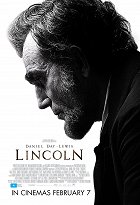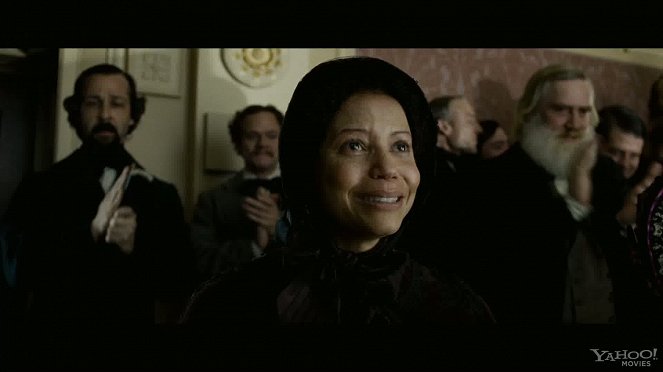Directed by:
Steven SpielbergScreenplay:
Tony KushnerCinematography:
Janusz KaminskiComposer:
John WilliamsCast:
Daniel Day-Lewis, Sally Field, Joseph Gordon-Levitt, Tommy Lee Jones, John Hawkes, Hal Holbrook, James Spader, Tim Blake Nelson, Bruce McGill, Joseph Cross (more)VOD (1)
Plots(1)
A revealing drama that focuses on the 16th President's tumultuous final months in office. In a nation divided by war and the strong winds of change, Lincoln pursues a course of action designed to end the war, unite the country and abolish slavery. With the moral courage and fierce determination to succeed, his choices during this critical moment will change the fate of generations to come. (20th Century Fox UK)
(more)Videos (56)
Reviews (14)
I love how different every Steven Spielberg film has been in recent years. How each time he tries a slightly different approach, a different genre, and works with different actors to get it right every time. Like now. For the record, I consider Amistad to be one of Spielberg's best films ever, which made me all the more eager to see how he would deal with slavery this time around. Almost as good (i.e., Amistad is better after all). To make a two and a half hour long film in which there is only talking and dozens of historical characters pass through obviously bothers some people. I don't understand why. A lot of so-called reviewers grumble that the film is a messy, chatty stew that was made just to win an Oscar(s). And most importantly, "there are no battles - even in War Horse there were more". Oh, my God, people! Lincoln is great precisely because there are no battles. We know that the Civil War is raging, we can imagine what a tragedy it is thanks to the opening scene, but why should we continue to watch it? Isn't it enough to watch what it does to people? I think absolutely. The relentless pursuit of the 13th Amendment is a hundred times more thrilling than scenes of a battlefield where cannons tear people apart. And that effort is well described - as is President Lincoln. A sensible and stubbornly opinionated man who has his quirks, his ailments, but also a sense of humor, a perpetual storyteller and (the nicest surprise for me) a thoroughly skilled schemer. The characters, of which there are definitely not as many as many people claim, can be beautifully understood thanks to their performances, the individual stories into which the whole plot is divided are excellent and especially well ended (the last scene of Tommy Lee Jones!). There's not much to say about the actors, Steven Spielberg doesn't pick bad ones... I just wonder why Liam Neeson turned down the role when he's certainly not too old to be the Lincoln we see here. But Daniel Day-Lewis is... Wow! Amazing! So now it's just classic praise for Kaminski's stunning cinematography, which once again plays with light and shadow and looks great in the movie theatre, and of course Williams' music (it doesn't stand out in the film as much as it does on the separate soundtrack, but it's still divine). Five pure stars.
()
Big words, lofty speeches, and in a way, just one big Abraham Lincoln bon mot. Steven Spielberg adored this part of American history so much that he simply made a passage from a history textbook. The brief family passages reveal sparse fragments about the main character while the movie strives purely for annotation, peace, and political negotiation. No emotions, no enthusiasm. Just with perfectly crafted production and zero added value. And we all knew even before the first applause that Daniel Day-Lewis wouldn't just play Abraham, but he would completely become him. The disappointment is even greater now, since Steven has obviously filmed a(nother) magnum opus of his dreams and yet managed to entertain me only with some unbridled Tommy Lee Jones and, as expected, the scene of the actual voting itself. After seeing this, the slightly problematic War Horse now looks like a perfect period piece.
()
Griffith, Ford, Spielberg. Lincoln. Three great American directors and their respective versions of the Lincoln myth. Though Spielberg takes an honest and respectful approach to Lincoln’s personality, creating a cult and idealising a democratic idea is not as important to him as drawing the viewer into the narrative. Above all, this is a riveting political drama, with Abraham Lincoln as the protagonist. It is fascinating to watch how smoothly one of Spielberg’s least action-oriented and least epic films moves forward, how the individual scenes are knitted together, how the director works with the deadline (to get 20 votes by the end of January), how the personal storyline serves the work storyline. The film does not primarily set out to depict Lincoln as a messianic figure demonstrating helpfulness toward all human beings without distinction, and such deification, if it happens, never overshadows the central goal of pushing through the Thirteenth Amendment before the end of the Civil War. We may even have doubts about the “purity” of Lincoln’s relentless pursuit of justice in the face of the law – we are not led to adopt a clear position as actively as in Spielberg’s other socio-political films, e.g. through impassioned music. Furthermore, the narrative is slowed the most by Lincoln’s “Christ-like” tendency to sit down in front of a group of listeners and start telling them a story. Does this really prove to us that Lincoln is the father of the American nation, who could take the liberty of making jokes about George Washington, or have we entered the realm of political satire about an elderly gentleman who liked to talk at times when it was necessary to act? The father interpretation would clearly be more appropriate also for the repeated adoption of the younger son’s childish perspective (including a very clever narrative feint in the climax), but to me it particularly involved the highlighting of the lack of didacticism in Spielberg’s approach. With the flawlessly cast actors and very impressive images (the meaning-making lighting and placement of the characters, frontal shooting, when there is a reason for every movement), With Lincoln, Spielberg primarily constructed an intelligent drama that ceaselessly keeps us on our toes and requires constant linking of contexts. And only then did he create a myth. 90%
()
People will expect from this movie whatever they will. It was made by Spielberg, so in this respect there is nothing wrong with it, more or less. Daniel Day-Lewis in turn trained god knows how many years for this character. Everybody keeps saying that he articulates like Abraham, but nobody has really seen him alive. But yeah, I get it. But I’d say that such a movie only makes sense for the USA. Over here, it’s average at best and it’s impossible to have any deep emotions about it. Quite the contrary. I only watched it because of Spielberg and it was a waste of time.
()
In some ways, Lincoln uncomfortably reminded me of last year's sensational The Help. Probably due to the film’s ostentatious clinging to the fact that black and white, truth and falsehood have no shades. Spielberg made a film that reminded me of Eliad's concept of an absolute epic time. It is not a historical drama. It's a myth. A myth in which politicians disintegrate into enlightened progressivists, hysterical obscurantists and spineless "hesitators". A myth in which we do not ask what motivates the main character to such a determined attitude, what drives him forward, because the main character himself is the absolute truth (although it suggests a certain internal ruggedness in the film, the film never lets it prevail and disrupt the state aura). Lincoln could not have wished for a better form than Daniel Day Lewis imprinted on him - slow, deliberate, genial, infinitely kind, yet convinced and convincing to the bone. Spielberg treats the character with striking iconicity - the way he places him in the shots, the way he uses the meaning-creating light, only confirms to us that Lincoln the mortal is not in front of us, but rather Lincoln the icon. When the president dies, Steven draws a baroque shot in which life is darkness and death is light ("He has gone to Eternity"). The Hagiography of the Saint, including the structure of the narrative - an exposition revealing the world in imbalance / enlightenment through dream / rectification / martyrdom (something that has worked well since the Middle Ages, through messianism, to this day). I'm not making fun of it, I’m not questioning it. I've seen other deified lumens with a far greater degree of dilettantism, and it does not bother me in Lincoln. But it also doesn't affect me in any way. This is a film-ritual for believers, whether "Lincoln" or "Spielberg" lovers, who will compete in praising how narratively and formally brilliant it is (and it indeed is). I do not deny the film the visual captivation of classical art, nor the narrative prowess with which Spielberg brings humor to the leather framework of parliamentary debates and skillfully alternates spatial-temporal plans. But the film is cold, simplistic in some respects, avoiding real problems... I have to smile a little: when Lincoln bribes the Democrats to help him out, we can agree that he's doing the right thing (because he represents the truth, "it's a long time ago", and moreover it's filmed as a comedy). But when the protagonist of The Ides of March does the same thing, it's disgusting pragmatism, dirt, disgusting politics, and American critics are writing about a film that today's America doesn't need. Today's America certainly needs Lincoln and a solid granite myth. As a spectator, I don't need to see anything like this, even if it has a more self-virtuoso form. It is, in my view, self-affirming ideological boredom that defends any doubts by eradicating them with the schemes seen a hundred times, to which the elite actors' faces and the proven structure of the narrative give the impression of uniqueness. But such a film is not able to offer me anything important for life, just a yawning abyss of distance from the perfectly coherent and closed world of myth. With all due respect, Mr. Spielberg.
()
(less)
(more)



Ads